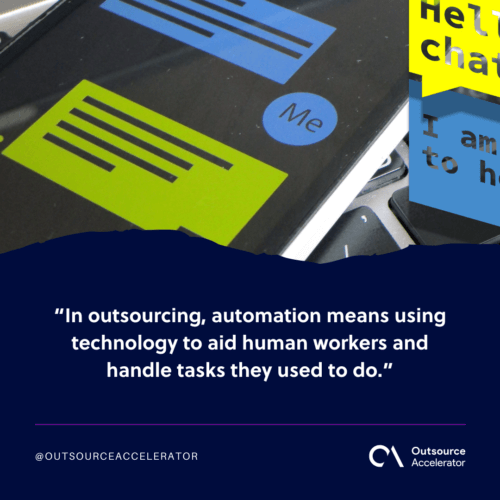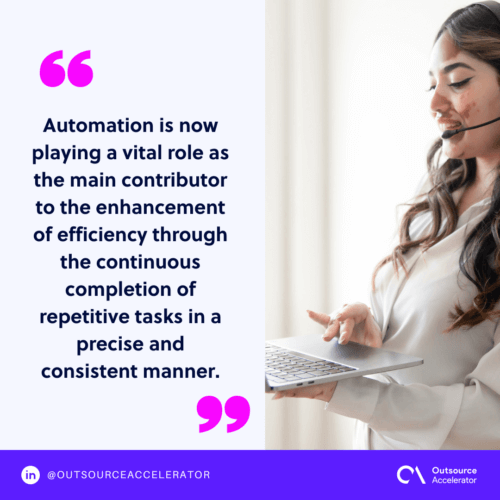Evolving BPO trends: Automation and AI

This article is a submission by IdeasUnlimited. IdeasUnlimited takes pride in representing a world-class support services provider with over a decade of experience in delivering Remote Workforce Optimization and Call Center services.
Business Process Outsourcing (BPO) has remained an integral part of the corporate strategies of world business for a while. This strategy helps organizations achieve efficiency and cost reduction by allowing them to acquire services or produce goods from outside experts.
The BPO sector is vibrant and growing quickly; it includes all kinds of services, from customer support, and human resources, to IT and back-office tasks.
The shift in the global market evolution and the speeded pace of technology development have placed the industry at the forefront of changing workplace practices and the service delivery model.
In such a fast-evolving landscape, keeping pace with changes and new trends is a must for a BPO firm that does not want to give up its competitive edge and that has to face more and more complex client requests. Such trends normally indicate shifts in service delivery and can greatly affect profitability and market positioning.
Today, there are certain trends relevant to bearing impact and transformation potential of larger value within the BPO sector.
Automation and AI, redefining the heart of service delivery in BPO, is enabling time-bound and outcome-based execution of routine jobs with higher efficiency and precision.
The very same technology is empowering the customer service ecosystem to better their decision-making processes, customer interactions, and operational workflows right from their support systems to make them smarter and more responsive.
Automation in BPO
In outsourcing, automation means using technology to aid human workers and handle tasks they used to do. This includes technologies like RPA, intelligent workflows, and chatbots, which manage tasks such as data entry and customer service.
This digitization not only makes processes more efficient but also reduces errors and speeds up service delivery in the BPO sector.

Commonly-automated processes
In the BPO sector, automation involves using technology to handle repetitive tasks efficiently and reduce costs.
These tasks, such as data processing, payroll, and customer support, are now performed by machines and software, including chatbots and FAQ articles. This shift to automation is driven by the desire to stay competitive and meet client expectations.
For example, BPO companies are integrating Robotic Process Automation (RPA) with existing IT systems to streamline workflows. RPA robots can quickly process information from different systems, improving transaction times and minimizing errors
Automation is also prevalent in customer service. These departments enhance operations by using chatbots and automated response systems are used to handle initial customer inquiries without needing the human touch.
This strategy helps lessen staff’s responsibilities while ensuring that the responses are fast and reaching customers 24/7, which is a key factor of customer satisfaction.
Yet another case is with regards to document handling and processing when tools for automation can scan, sort, and store documents more productively than human systems where time and cost savings are worthwhile to the operations.
Benefits and challenges of automation in BPO
The reality of the benefits of automation in BPO is evident and quantifiable. Some benefits include increased productivity, lower running costs, low error rates, and people reallocation to more serious tasks.
Nevertheless, the difficulties should not be underestimated.
Automation demands huge capital expenditure on technology and teaching. The other thing is about the human aspect of automation; addressing job displacement issues, and retraining staff whose jobs have been automated is also very important.
To conquer these barriers, BPO firms can take a phased approach to automation, which will initially deal with the less complicated processes and then gradually increase the scope as trust and capability develop.
It is necessary to have efficient communication and transition plans to manage the change, train the personnel for the new roles and make them understand the advantages to the entire business that will be brought by automation.
AI integration
AI is of great importance in BPO, as it can substantially increase operational efficiencies as well as upgrade the decision processes and personalize customer interactions.
Through automation, AI allows BPO providers to provide advanced services that go further than just single-task execution to include decision support and analytics.
Impact on service quality and efficiency
The integration of AI into BPO services has significantly enhanced service quality and operational efficiency. AI systems process information quickly and accurately, reducing downtime and improving response times for customers.
By standardizing and consistently applying processing steps, AI improves quality control and reduces inconsistencies caused by human factors.
Automation is now playing a vital role as the main contributor to the enhancement of efficiency through the continuous completion of repetitive tasks in a precise and consistent manner.

AI has thus become a key to the BPO business in the sphere of decision-making and customer care, granting companies the ability to offer an intelligent and responsive approach.
The processing of these trends is not just a response to the changes in the market scenario but a vital strategy that the BPO providers should adopt to ensure their long-term success. By integrating these technologies, BPO companies are able to enhance process productivity, lead to better quality, and plan business continuity.
An inclination to these trends along with the possibility to remain competitive is a growth of consumer expectation and handling of the complexity of global procedures.







 Independent
Independent




